Psychology has evolved significantly due to the contributions of numerous key figures, many of whom are integral to the AP Psychology curriculum. These pioneers have shaped various theories, methodologies, and applications that form the foundation of modern psychology. From the establishment of experimental psychology by Wilhelm Wundt to the development of psychoanalysis by Sigmund Freud and the behaviorist theories of B.F. Skinner, each historical figure has provided unique insights that have advanced our understanding of human behavior, cognition, and emotion. Their work continues to influence contemporary psychological practices and research, making their contributions essential topics in AP Psychology courses.
Learning Objectives
Understand the key contributions of major historical figures in psychology, including their theories, experiments, and impact on the field. Learn about Wilhelm Wundt’s founding of experimental psychology, Sigmund Freud’s development of psychoanalysis, and B.F. Skinner’s behaviorist principles. Recognize the significance of Jean Piaget’s cognitive development theory, Carl Rogers’ humanistic approach, and Albert Bandura’s social learning theory. Appreciate the diverse perspectives and methodologies these figures introduced, shaping contemporary psychology and its various applications in understanding human behavior and mental processes.
Wilhelm Wundt (1832-1920)
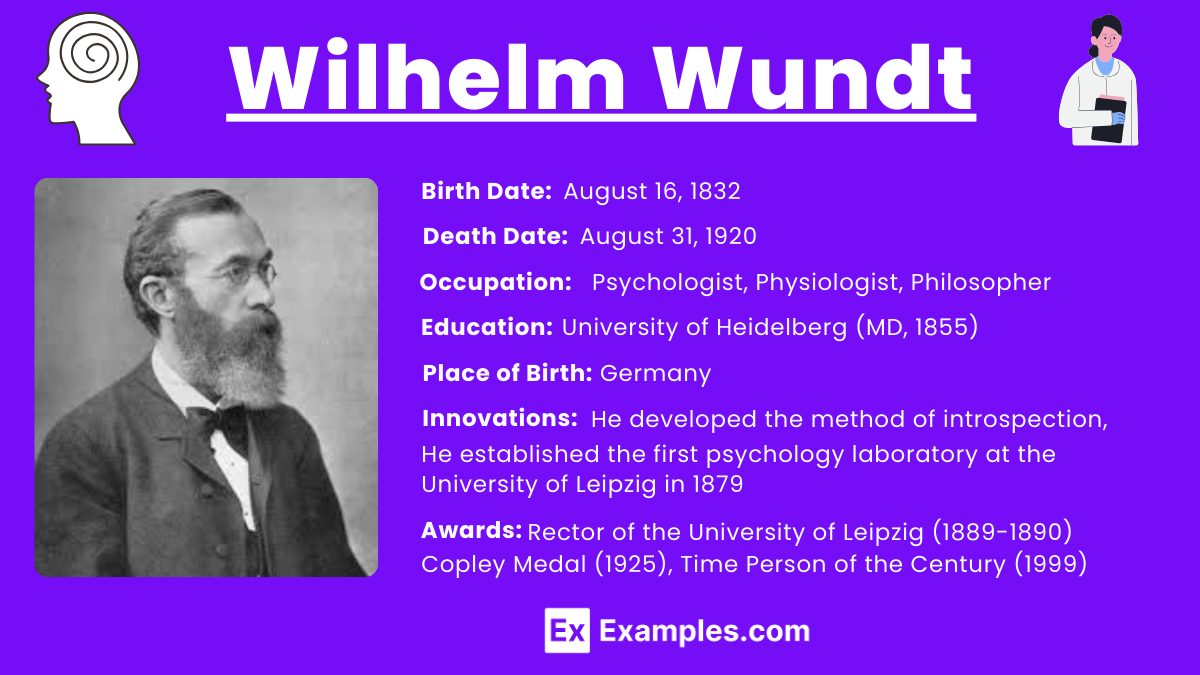
Wilhelm Wundt – Bio Data
Birth Date: August 16, 1832
Death Date: August 31, 1920
Occupation: Psychologist, Physiologist, Philosopher
Education:
- University of Heidelberg (MD, 1855)
- University of Tübingen
- University of Berlin
Place of Birth: Neckarau, Grand Duchy of Baden, German Confederation (now part of Mannheim, Germany)
Innovations:
- Founding of Experimental Psychology: Wilhelm Wundt is often considered the “father of experimental psychology.” He established the first psychology laboratory at the University of Leipzig in 1879, marking the formal beginning of psychology as an experimental and scientific discipline.
- Introspection Method: He developed the method of introspection, which involved careful observation and reporting of one’s own conscious experiences.
- Voluntarism: Wundt’s theory that the mind has the capacity to organize mental contents into higher-level thought processes.
- Cultural Psychology: He contributed significantly to cultural psychology, focusing on language, myths, and customs.
Awards and Honors:
- Rector of the University of Leipzig (1889-1890)
- Member of the Royal Society of Sciences in Göttingen
- Numerous honorary doctorates and memberships in prestigious academic societies throughout his career.
Wilhelm Wundt’s pioneering work laid the foundation for modern psychology, transforming it from a branch of philosophy to a distinct scientific discipline. His contributions have had a lasting impact on the study and understanding of human behavior and mental processes.
William James (1842-1910)
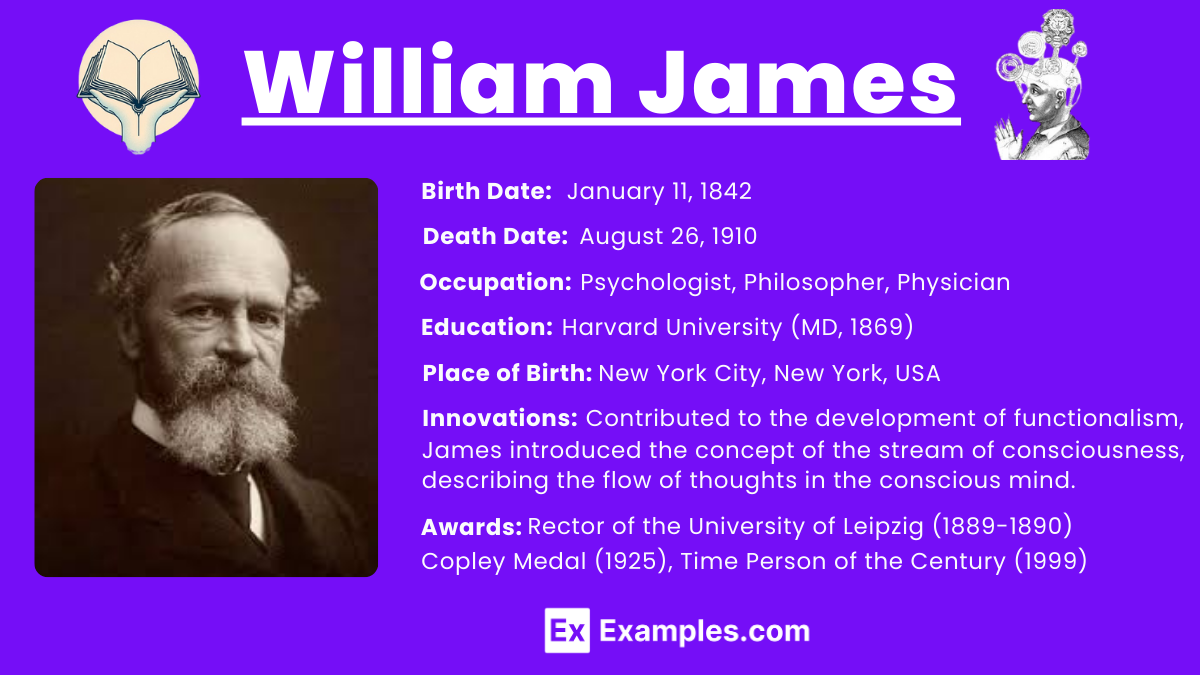
Birth Date: January 11, 1842
Death Date: August 26, 1910
Occupation: Psychologist, Philosopher, Physician
Education:
- Harvard University (MD, 1869)
- Lawrence Scientific School at Harvard University
- Studied painting before shifting to scientific studies
Place of Birth: New York City, New York, USA
Innovations:
- Pragmatism: William James was a leading proponent of the philosophical school of pragmatism, which assesses the truth of beliefs by their practical consequences.
- Functionalism: He contributed to the development of functionalism in psychology, focusing on how mental activities help an organism adapt to its environment.
- James-Lange Theory of Emotion: Along with Carl Lange, he proposed that emotions are the result of physiological responses to external events.
- Stream of Consciousness: James introduced the concept of the “stream of consciousness,” describing the flow of thoughts in the conscious mind.
- Varieties of Religious Experience: His influential work explored the nature of religious experiences and their impact on individuals’ lives.
Awards and Honors:
- President of the American Psychological Association (APA) (1894-1895)
- Honorary degrees from Princeton, Harvard, and the University of Edinburgh
- Foreign member of the Royal Prussian Academy of Sciences
William James’ work had a profound influence on both psychology and philosophy, shaping the development of these fields in the United States and beyond. His ideas on pragmatism, the nature of consciousness, and the psychology of religion remain influential today.
Sigmund Freud (1856-1939)
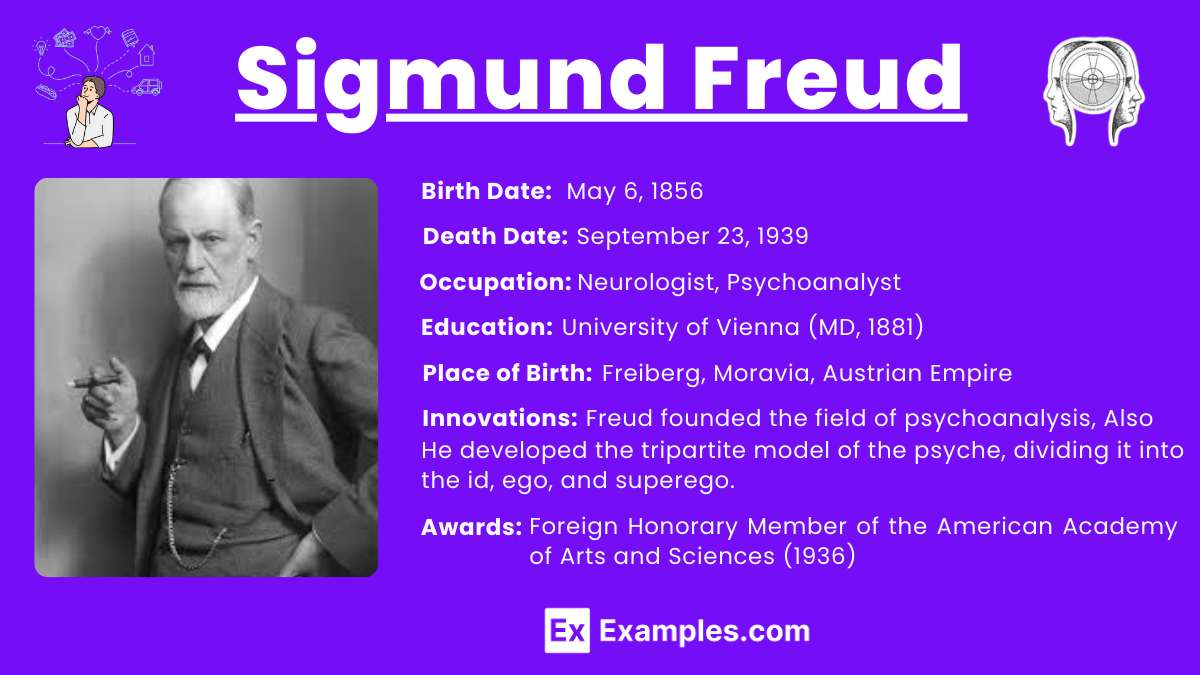
Birth Date: May 6, 1856
Death Date: September 23, 1939
Occupation: Neurologist, Psychoanalyst
Education:
- University of Vienna (MD, 1881)
Place of Birth: Freiberg, Moravia, Austrian Empire (now Příbor, Czech Republic)
Innovations:
- Psychoanalysis: Sigmund Freud founded the field of psychoanalysis, a clinical method for treating psychopathology through dialogue between a patient and a psychoanalyst.
- Unconscious Mind: He emphasized the importance of the unconscious mind, suggesting that unconscious motives and conflicts influence behavior.
- Oedipus Complex: Freud introduced the concept of the Oedipus complex, describing a child’s feelings of desire for the opposite-sex parent and jealousy toward the same-sex parent.
- Defense Mechanisms: He identified various defense mechanisms, such as repression, projection, and denial, which the ego uses to protect itself from anxiety.
- Dream Analysis: Freud proposed that dreams are a form of wish fulfillment and that analyzing dreams can provide insights into the unconscious mind.
- Structural Model of the Psyche: He developed the tripartite model of the psyche, dividing it into the id, ego, and superego.
Awards and Honors:
- Goethe Prize (1930)
- Foreign Honorary Member of the American Academy of Arts and Sciences (1936)
- Honorary doctorates from various universities, including Clark University and the University of Vienna
Sigmund Freud’s theories revolutionized the understanding of human psychology, laying the groundwork for many subsequent developments in the field. Despite controversy and debate over some of his ideas, Freud’s work remains foundational in the study of the human mind and behavior.
John B. Watson (1878-1958)
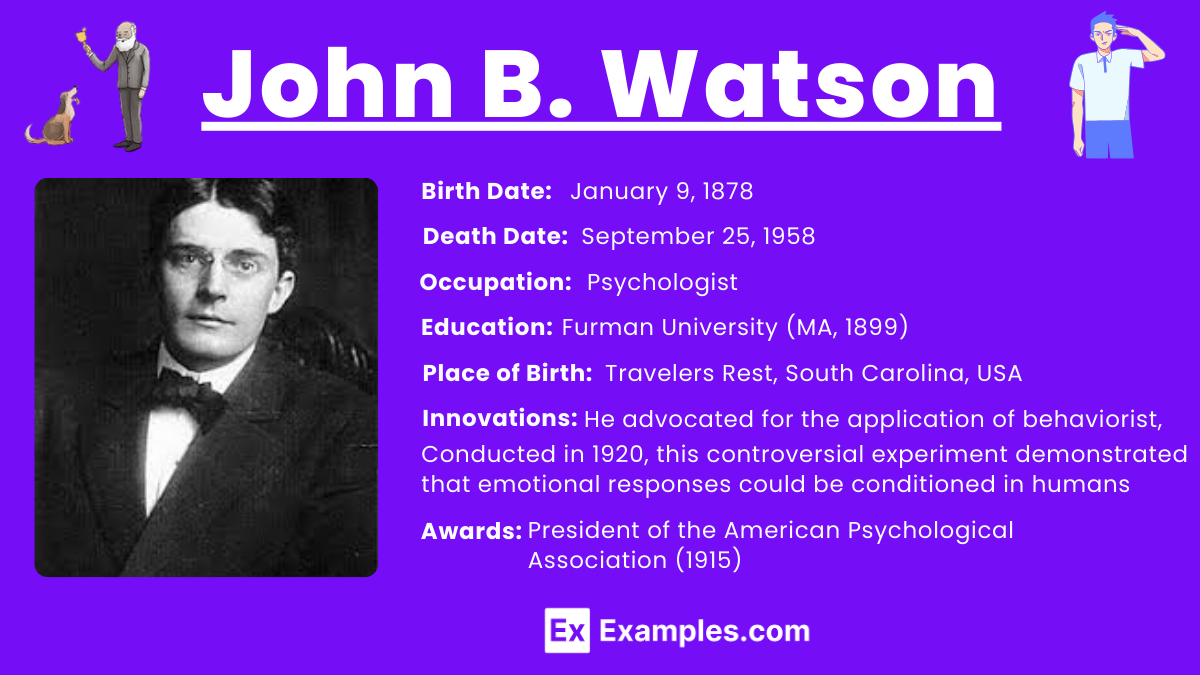
Birth Date: January 9, 1878
Death Date: September 25, 1958
Occupation: Psychologist
Education:
- Furman University (MA, 1899)
- University of Chicago (PhD, 1903)
Place of Birth: Travelers Rest, South Carolina, USA
Innovations:
- Behaviorism: John B Watson is best known for founding the school of behaviorism, which emphasizes the study of observable behavior and rejects the analysis of internal mental states.
- Little Albert Experiment: Conducted in 1920, this controversial experiment demonstrated that emotional responses could be conditioned in humans. Watson and his assistant Rosalie Rayner conditioned a young child, Albert, to fear a white rat by pairing the sight of the rat with a loud, frightening noise.
- Classical Conditioning: Building on Pavlov’s work, Watson applied principles of classical conditioning to human behavior, showing how environmental stimuli can shape behavior.
- Behavioral Modification: He advocated for the application of behaviorist principles to modify and control behavior in various settings, including education and therapy.
Awards and Honors:
- President of the American Psychological Association (1915)
- Numerous contributions to journals and books on psychology and behaviorism
John B. Watson’s work significantly influenced the field of psychology, shifting the focus towards the study of observable behavior and laying the groundwork for later developments in behavior therapy and applied behavior analysis. His emphasis on the environment’s role in shaping behavior marked a pivotal shift from introspective methods to more objective, scientific approaches.
B.F. Skinner (1904-1990)
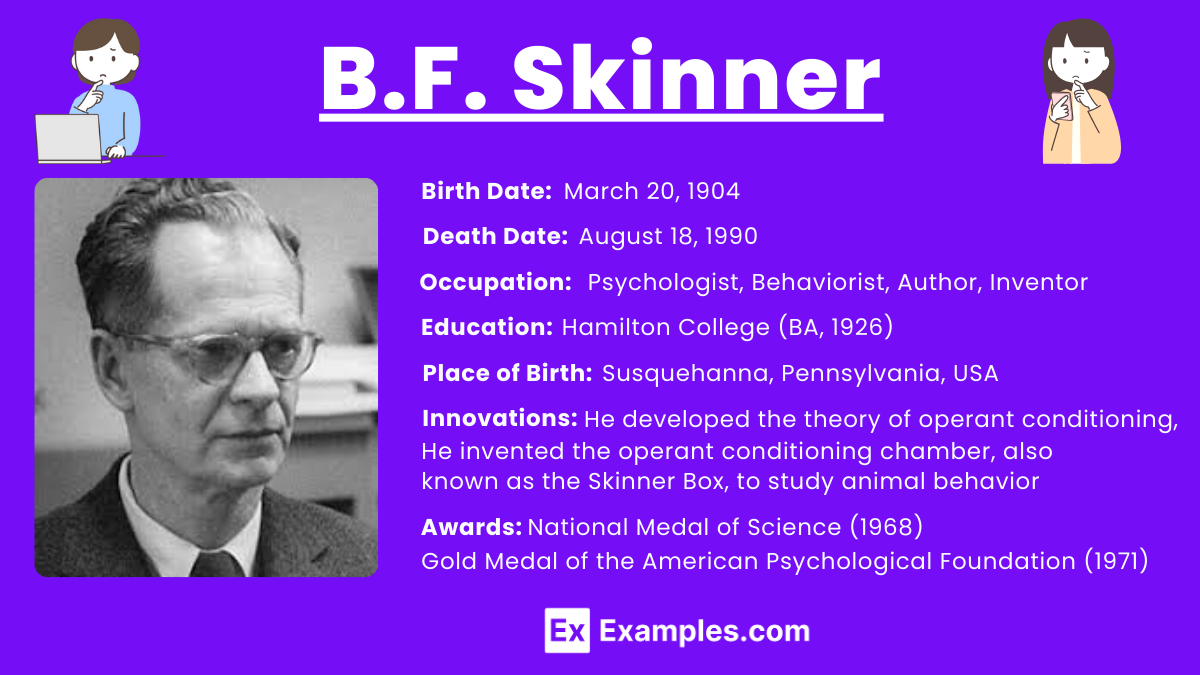
Birth Date: March 20, 1904
Death Date: August 18, 1990
Occupation: Psychologist, Behaviorist, Author, Inventor
Education:
- Hamilton College (BA, 1926)
- Harvard University (PhD in Psychology, 1931)
Place of Birth: Susquehanna, Pennsylvania, USA
Innovations:
- Operant Conditioning: B.F. Skinner developed the theory of operant conditioning, which explains how behaviors are influenced by their consequences. He distinguished between positive reinforcement, negative reinforcement, and punishment.
- Skinner Box: He invented the operant conditioning chamber, also known as the Skinner Box, to study animal behavior in a controlled environment. This device allowed precise measurement of responses and their consequences.
- Schedules of Reinforcement: Skinner identified different schedules of reinforcement (fixed-ratio, variable-ratio, fixed-interval, and variable-interval) and their effects on behavior.
- Behavior Modification: He applied operant conditioning principles to behavior modification, developing techniques to increase or decrease specific behaviors.
- Verbal Behavior: In his book “Verbal Behavior,” Skinner analyzed human language and communication using behaviorist principles.
- Cumulative Recorder: He developed the cumulative recorder, a device for graphically recording responses in operant conditioning experiments.
Awards and Honors:
- National Medal of Science (1968)
- Gold Medal of the American Psychological Foundation (1971)
- Human of the Year Award by the American Humanist Association (1972)
- Award for Lifetime Contributions to Psychology from the American Psychological Association (1990)
- Honorary degrees from several universities, including Harvard University
B.F. Skinner’s work profoundly influenced psychology, particularly in the areas of learning and behavior. His research on operant conditioning and reinforcement remains foundational in behavioral psychology and has applications in various fields, including education, therapy, and behavior modification.
Carl Rogers (1902-1987)
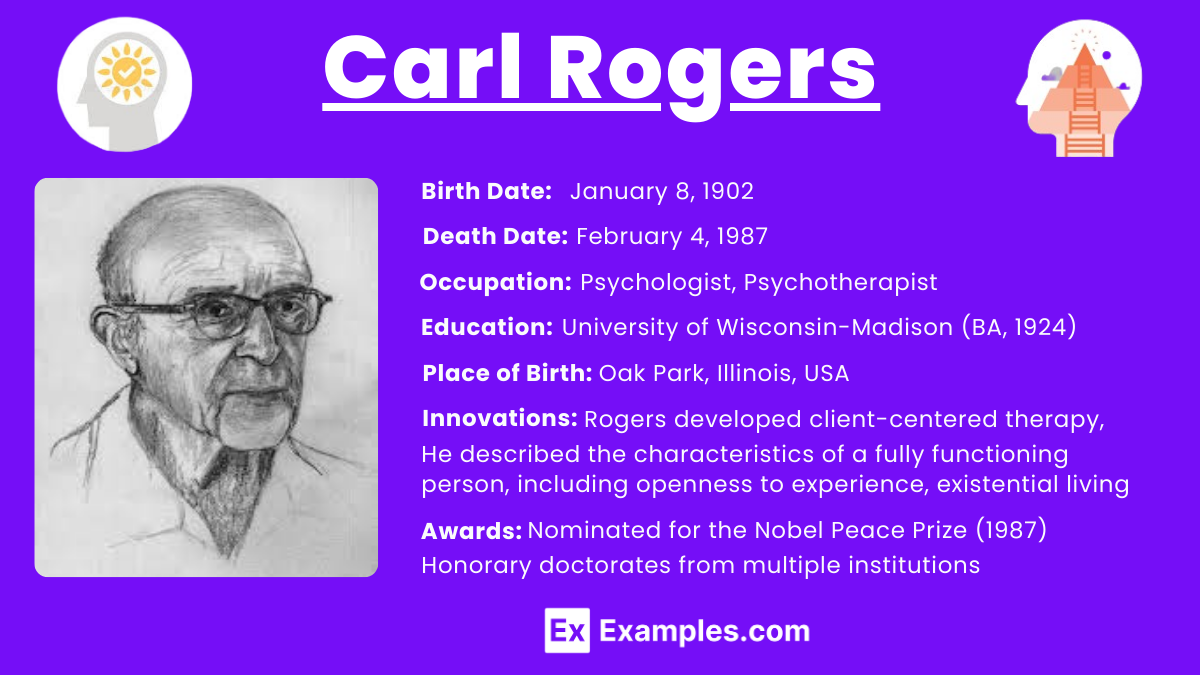
Birth Date: January 8, 1902
Death Date: February 4, 1987
Occupation: Psychologist, Psychotherapist
Education:
- University of Wisconsin-Madison (BA, 1924)
- Union Theological Seminary (briefly attended)
- Columbia University Teachers College (MA, 1928; PhD, 1931)
Place of Birth: Oak Park, Illinois, USA
Innovations:
- Client-Centered Therapy: Carl Rogers developed client-centered (or person-centered) therapy, emphasizing the therapist’s role in providing a supportive environment in which clients can find their own solutions to their problems. This approach focuses on the client’s perspective and innate potential for growth.
- Unconditional Positive Regard: He introduced the concept of unconditional positive regard, where therapists accept and support clients without judgment or conditions, fostering a safe and non-threatening therapeutic environment.
- Self-Actualization: Rogers believed in the human potential for self-actualization, the process of realizing and expressing one’s own capabilities and creativity.
- The Fully Functioning Person: He described the characteristics of a fully functioning person, including openness to experience, existential living, trust in oneself, creativity, and a rich, full life.
- Nondirective Approach: Rogers pioneered a nondirective approach to therapy, where the therapist avoids directing the course of therapy and instead facilitates the client’s self-discovery and personal growth.
Awards and Honors:
- Distinguished Scientific Contribution Award from the American Psychological Association (1956)
- Humanist of the Year by the American Humanist Association (1964)
- Honorary doctorates from multiple institutions
- Nominated for the Nobel Peace Prize (1987)
Carl Rogers’ contributions significantly impacted the field of psychotherapy and counseling. His humanistic approach emphasized empathy, genuineness, and the therapeutic relationship, influencing not only psychology but also education, management, and other fields focused on human development and interpersonal relationships.
Abraham Maslow (1908-1970)
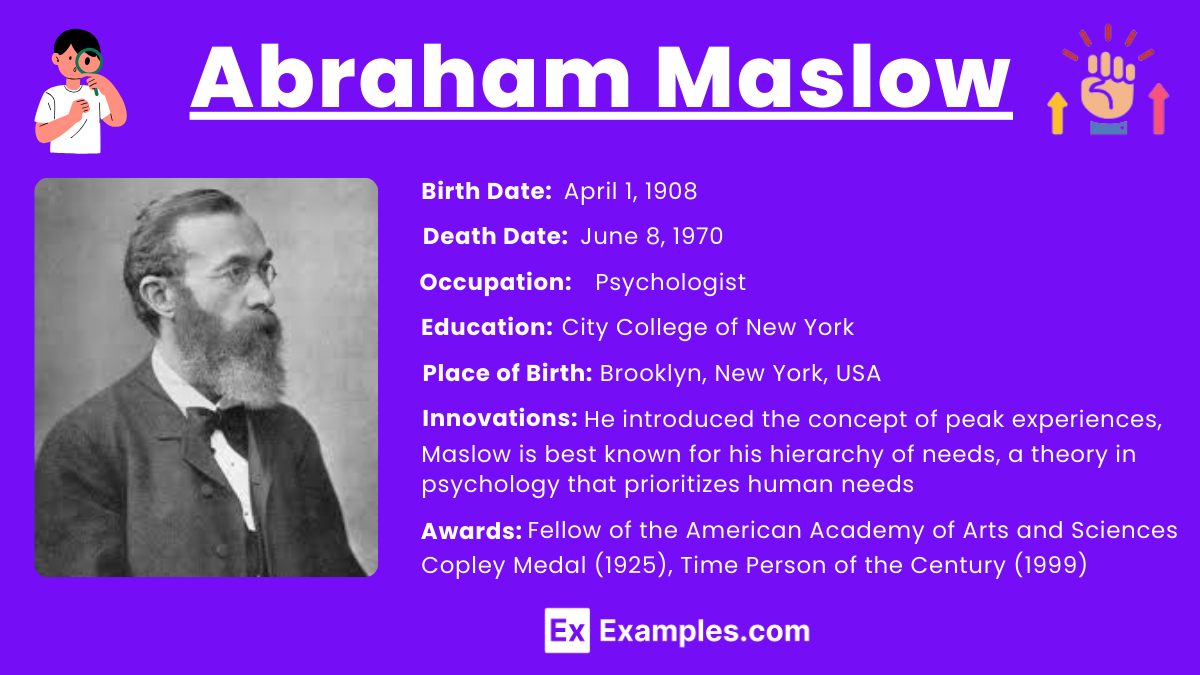
Birth Date: April 1, 1908
Death Date: June 8, 1970
Occupation: Psychologist
Education:
- City College of New York (Transferred)
- University of Wisconsin (BA, 1930; MA, 1931; PhD, 1934)
Place of Birth: Brooklyn, New York, USA
Innovations:
- Hierarchy of Needs: Abraham Maslow is best known for his hierarchy of needs, a theory in psychology that prioritizes human needs in a five-tier model, ranging from physiological needs to self-actualization. The levels are:
- Physiological Needs
- Safety Needs
- Love and Belongingness Needs
- Esteem Needs
- Self-Actualization
- Self-Actualization: He expanded on the concept of self-actualization, describing it as the process of realizing one’s potential and seeking personal growth and peak experiences.
- Humanistic Psychology: Maslow is a key figure in humanistic psychology, emphasizing the positive aspects of human nature and the potential for personal growth.
- Peak Experiences: He introduced the concept of peak experiences, which are profound moments of love, understanding, happiness, or rapture, during which a person feels more whole, alive, self-sufficient, and yet a part of the world.
- Motivation Theory: His work on motivation theory explored what drives human behavior, suggesting that individuals are motivated by unmet needs and strive to fulfill them in a hierarchical order.
Awards and Honors:
- Fellow of the American Academy of Arts and Sciences
- Numerous honorary degrees and recognitions from academic institutions
Abraham Maslow’s work has had a lasting impact on psychology, particularly in understanding human motivation and development. His hierarchy of needs remains a fundamental concept in psychology, education, and management, influencing how we think about human potential and well-being.
Jean Piaget (1896-1980)
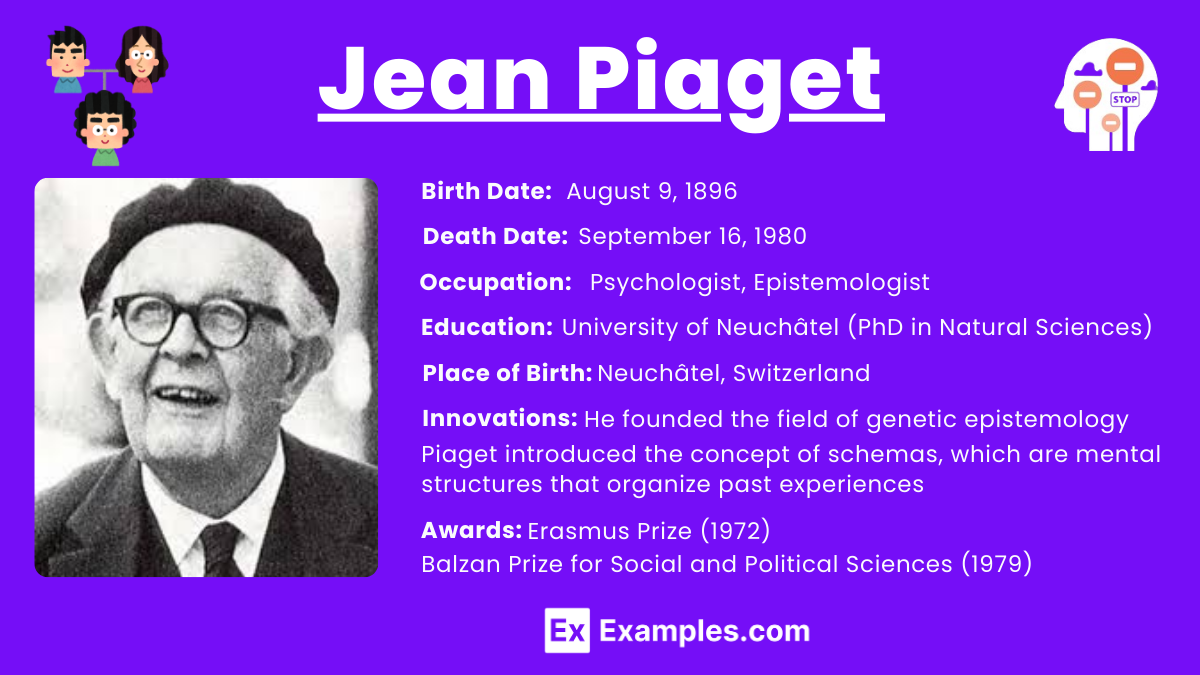
Birth Date: August 9, 1896
Death Date: September 16, 1980
Occupation: Psychologist, Epistemologist
Education:
- University of Neuchâtel (PhD in Natural Sciences, 1918)
Place of Birth: Neuchâtel, Switzerland
Innovations:
- Theory of Cognitive Development: Jean Piaget is renowned for his theory of cognitive development, which describes how children’s thinking evolves in stages as they mature. The stages are:
- Sensorimotor Stage (Birth to 2 years)
- Preoperational Stage (2 to 7 years)
- Concrete Operational Stage (7 to 11 years)
- Formal Operational Stage (11 years and up)
- Genetic Epistemology: He founded the field of genetic epistemology, studying the origins of knowledge and how it develops.
- Schemas: Piaget introduced the concept of schemas, which are mental structures that organize past experiences and provide a framework for understanding future experiences.
- Constructivism: He proposed that children construct their understanding of the world through interactions with their environment, emphasizing active learning.
- Assimilation and Accommodation: Piaget described two key processes in cognitive development: assimilation (integrating new information into existing schemas) and accommodation (modifying schemas in response to new information).
Awards and Honors:
- Erasmus Prize (1972)
- Balzan Prize for Social and Political Sciences (1979)
- Honorary doctorates from multiple universities, including Harvard University and the University of Cambridge
Jean Piaget’s groundbreaking work on cognitive development has had a profound impact on psychology and education. His insights into how children think and learn have influenced teaching methods and educational practices worldwide, emphasizing the importance of developmental stages and active learning in child development.
Lev Vygotsky (1896-1934)
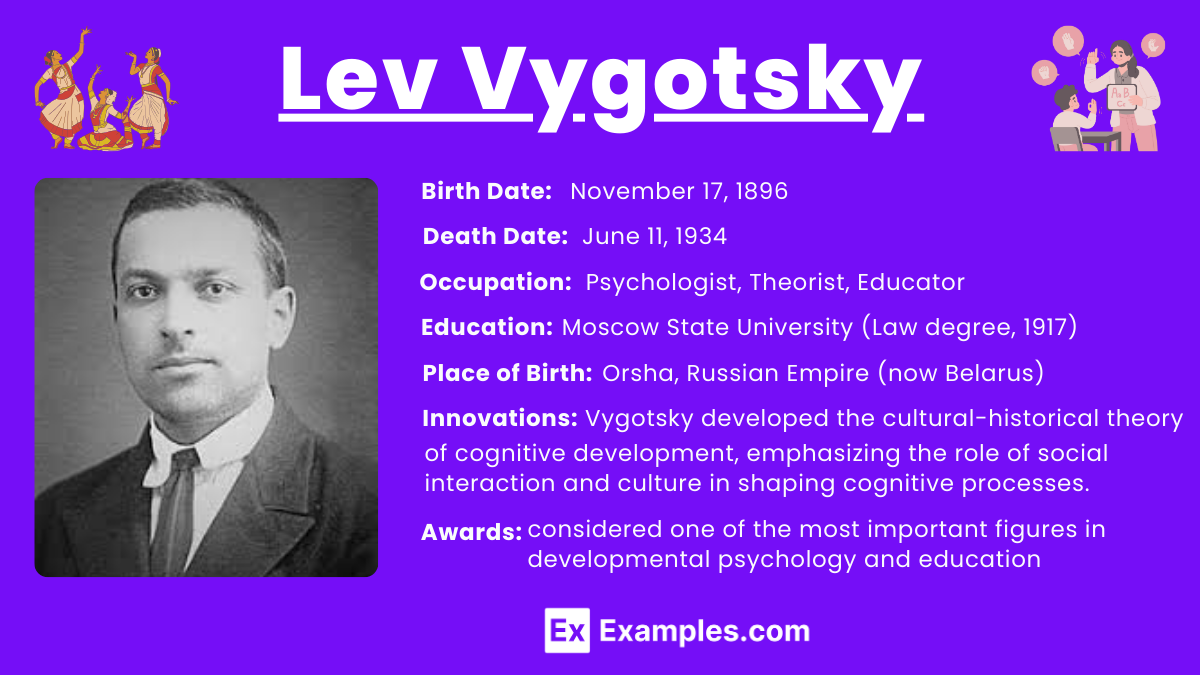
Birth Date: November 17, 1896
Death Date: June 11, 1934
Occupation: Psychologist, Theorist, Educator
Education:
- Moscow State University (Law degree, 1917)
- Shanyavsky People’s University (Courses in psychology, philosophy, literature)
Place of Birth: Orsha, Russian Empire (now Belarus)
Innovations:
- Cultural-Historical Theory: Lev Vygotsky developed the cultural-historical theory of cognitive development, emphasizing the role of social interaction and culture in shaping cognitive processes.
- Zone of Proximal Development (ZPD): He introduced the concept of the Zone of Proximal Development, which describes the range of tasks that a child can perform with the help and guidance of others but cannot yet perform independently.
- Scaffolding: Vygotsky’s work laid the foundation for the concept of scaffolding, where teachers and peers provide support to students as they learn new concepts, gradually removing assistance as the student becomes more competent.
- Language and Thought: He explored the relationship between language and thought, arguing that language plays a crucial role in cognitive development and that inner speech (internal dialogue) is a key component of this process.
- Sociocultural Theory: Vygotsky’s sociocultural theory posits that cognitive development is largely a result of social interactions and that learning is deeply embedded in cultural contexts.
Awards and Honors:
- Vygotsky’s work was not widely recognized during his lifetime, and he did not receive formal awards. However, his influence grew posthumously, and he is now considered one of the most important figures in developmental psychology and education.
Lev Vygotsky’s theories have had a lasting impact on education and psychology, particularly in understanding the social and cultural dimensions of learning and development. His ideas on the Zone of Proximal Development and the role of social interaction in cognitive development continue to influence teaching practices and educational research.
Erik Erikson (1902-1994)
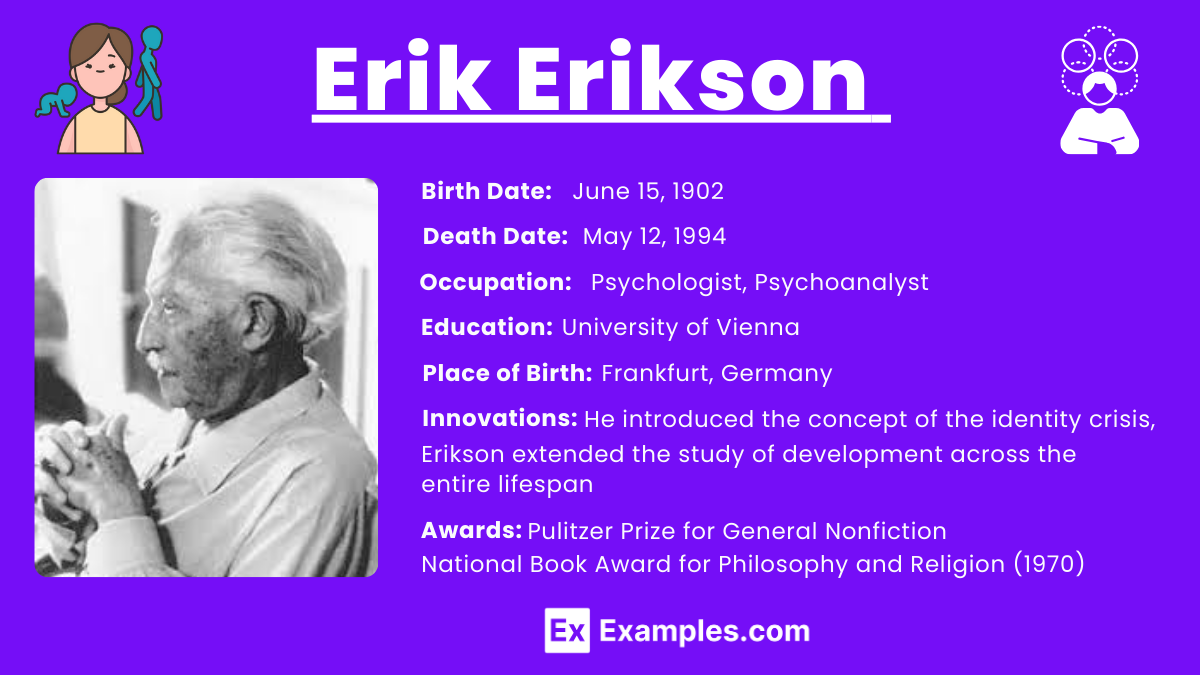
Birth Date: June 15, 1902
Death Date: May 12, 1994
Occupation: Psychologist, Psychoanalyst
Education:
- University of Vienna (Psychoanalytic training under Anna Freud)
- Studied at various institutions but did not earn a traditional degree
Place of Birth: Frankfurt, Germany
Innovations:
- Psychosocial Development Theory: Erik Erikson is best known for his theory of psychosocial development, which outlines eight stages of human development from infancy to adulthood. Each stage involves a specific conflict that must be resolved for healthy psychological development.
- Trust vs. Mistrust (Infancy)
- Autonomy vs. Shame and Doubt (Early Childhood)
- Initiative vs. Guilt (Preschool)
- Industry vs. Inferiority (School Age)
- Identity vs. Role Confusion (Adolescence)
- Intimacy vs. Isolation (Young Adulthood)
- Generativity vs. Stagnation (Middle Adulthood)
- Integrity vs. Despair (Late Adulthood)
- Identity Crisis: He introduced the concept of the identity crisis, emphasizing the importance of developing a personal identity during adolescence.
- Lifespan Perspective: Erikson extended the study of development across the entire lifespan, emphasizing that development does not stop in childhood but continues through adulthood and old age.
Awards and Honors:
- Pulitzer Prize for General Nonfiction (1970) for “Gandhi’s Truth”
- National Book Award for Philosophy and Religion (1970) for “Gandhi’s Truth”
- Distinguished Scientific Contribution Award from the American Psychological Association (1963)
- Honorary degrees from various institutions, including Harvard University and the University of California, Berkeley
Erik Erikson’s work has had a profound impact on psychology, particularly in understanding human development throughout the lifespan. His psychosocial development theory remains influential in both psychology and education, offering insights into the challenges and growth opportunities at each stage of life.
Albert Bandura (1925-2021)
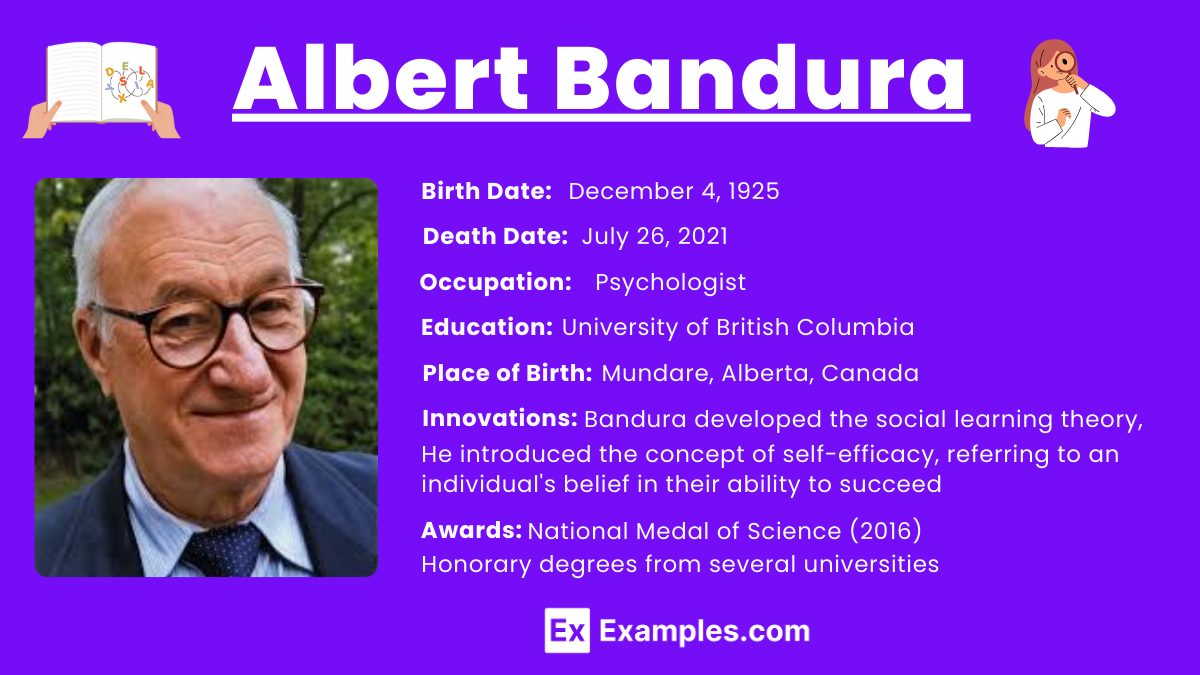
Birth Date: December 4, 1925
Death Date: July 26, 2021
Occupation: Psychologist
Education:
- University of British Columbia (BA in Psychology, 1949)
- University of Iowa (MA, 1951; PhD in Clinical Psychology, 1952)
Place of Birth: Mundare, Alberta, Canada
Innovations:
- Social Learning Theory: Albert Bandura developed the social learning theory, which posits that people learn behaviors, attitudes, and emotional reactions through observing others (modeling), rather than through direct experience alone.
- Bobo Doll Experiment: This famous experiment demonstrated that children could learn aggressive behaviors through the observation of adult models. It provided empirical evidence supporting the social learning theory.
- Self-Efficacy: Bandura introduced the concept of self-efficacy, referring to an individual’s belief in their ability to succeed in specific situations. High self-efficacy influences motivation, perseverance, and resilience.
- Reciprocal Determinism: He proposed that behavior is influenced by the interaction between personal factors, behavior, and the environment, which he termed reciprocal determinism.
- Observational Learning: Bandura highlighted the importance of observational learning, where individuals learn by watching and imitating the actions of others, integrating attention, retention, reproduction, and motivation processes.
Awards and Honors:
- Distinguished Scientific Contribution Award from the American Psychological Association (1980)
- National Medal of Science (2016)
- Thorndike Award for Distinguished Contributions to Educational Psychology (1999)
- Gold Medal Award for Life Achievement in the Science of Psychology from the American Psychological Foundation (2004)
- Honorary degrees from several universities, including the University of British Columbia, the University of Lethbridge, and the University of Ottawa
Albert Bandura’s work has had a significant impact on psychology, particularly in the areas of learning, motivation, and behavior modification. His theories on social learning, self-efficacy, and observational learning continue to influence research, education, and therapeutic practices.
Ivan Pavlov (1849-1936)
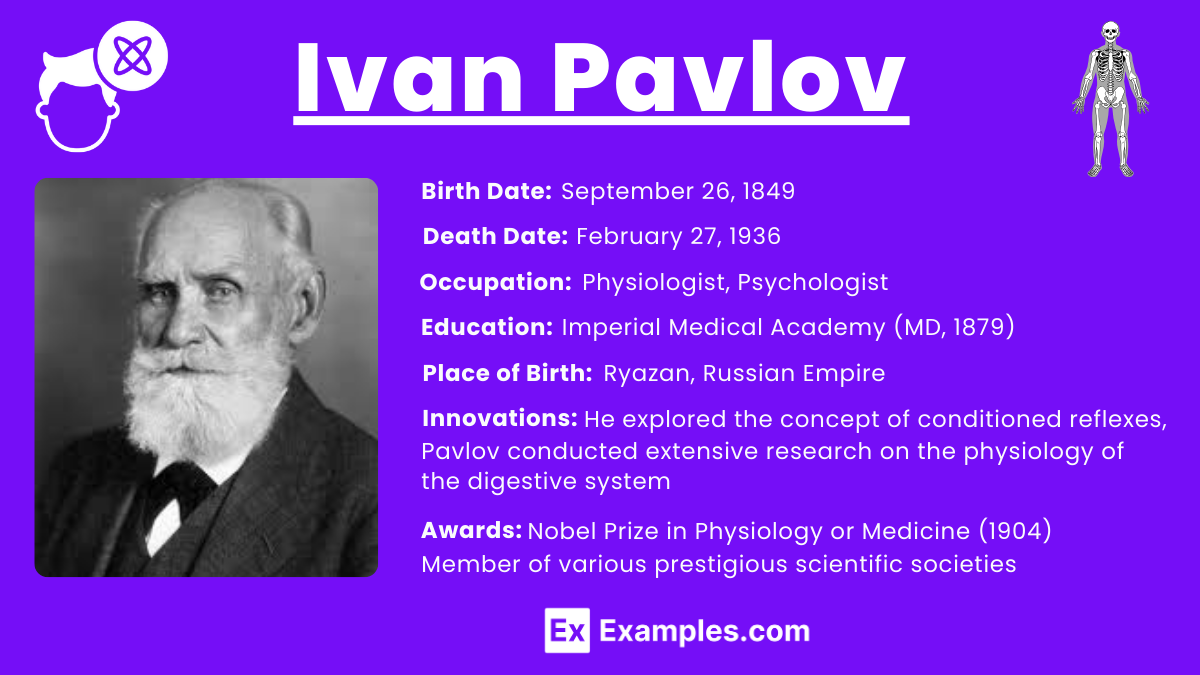
Birth Date: September 26, 1849
Death Date: February 27, 1936
Occupation: Physiologist, Psychologist
Education:
- St. Petersburg University (Degree in Natural Science, 1875)
- Imperial Medical Academy (MD, 1879)
Place of Birth: Ryazan, Russian Empire
Innovations:
- Classical Conditioning: Ivan Pavlov is best known for his discovery of classical conditioning. He demonstrated that dogs could be conditioned to salivate at the sound of a bell if the sound was repeatedly paired with the presentation of food. This pioneering work laid the foundation for behaviorist theories in psychology.
- Conditioned Reflexes: He explored the concept of conditioned reflexes, showing how neutral stimuli could become associated with significant stimuli to elicit conditioned responses.
- Pavlovian Conditioning: His research on Pavlovian (or respondent) conditioning provided key insights into learning processes and the development of associative learning.
- Gastrointestinal Physiology: Pavlov conducted extensive research on the physiology of the digestive system, including the mechanisms of gastric secretion, which earned him significant recognition.
Awards and Honors:
- Nobel Prize in Physiology or Medicine (1904) for his research on the physiology of the digestive system
- Member of various prestigious scientific societies, including the Russian Academy of Sciences
- Numerous honorary degrees and awards from scientific institutions worldwide
Ivan Pavlov’s work has had a profound and lasting impact on psychology and physiology. His discovery of classical conditioning continues to influence various fields, including psychology, education, and behavioral therapy, providing fundamental insights into how learning and behavior are shaped by environmental stimuli.
Carl Jung (1875-1961)
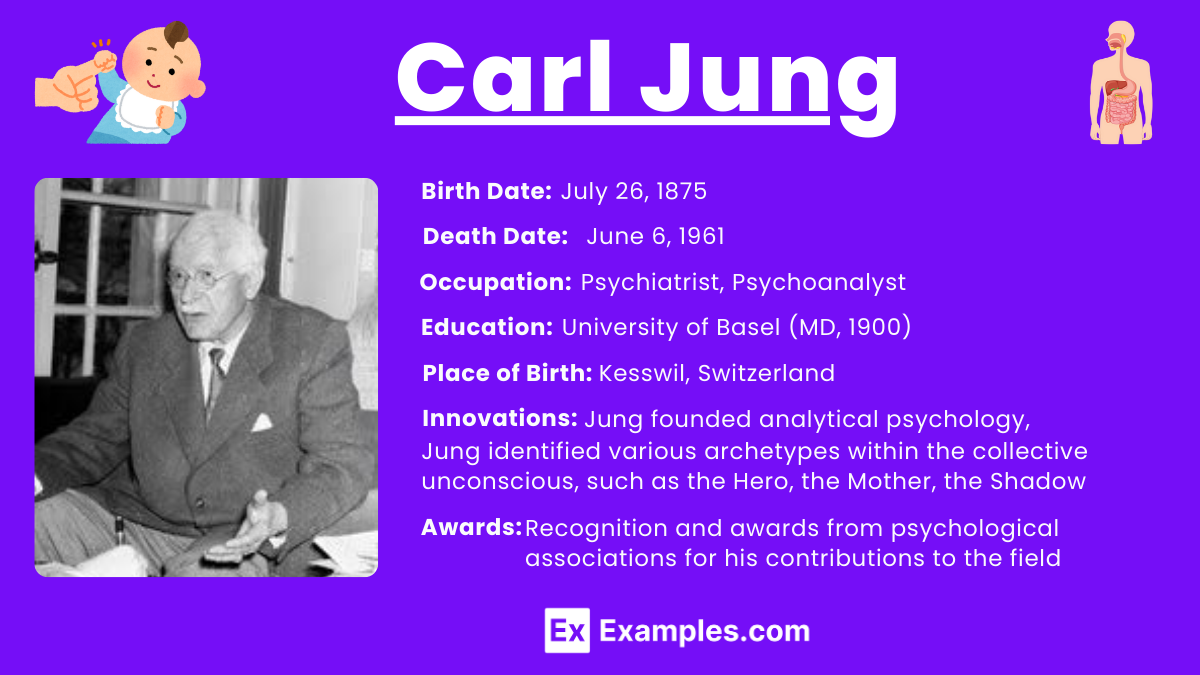
Birth Date: July 26, 1875
Death Date: June 6, 1961
Occupation: Psychiatrist, Psychoanalyst
Education:
- University of Basel (MD, 1900)
Place of Birth: Kesswil, Switzerland
Innovations:
- Analytical Psychology: Carl Jung founded analytical psychology, which emphasizes the exploration of the deep aspects of the unconscious mind.
- Collective Unconscious: He introduced the concept of the collective unconscious, proposing that it contains universal memories and archetypes shared by all humans.
- Archetypes: Jung identified various archetypes within the collective unconscious, such as the Hero, the Mother, the Shadow, and the Persona, which shape human behavior and experiences.
- Individuation: He developed the process of individuation, which involves integrating the conscious and unconscious parts of the mind to achieve personal wholeness and self-realization.
- Psychological Types: Jung proposed the theory of psychological types, which differentiates individuals based on their preferences for extraversion or introversion and their dominant cognitive functions (thinking, feeling, sensing, and intuiting). This theory influenced the development of the Myers-Briggs Type Indicator (MBTI).
- Dream Analysis: Jung placed significant emphasis on dream analysis, viewing dreams as a means to access the unconscious and gain insights into the psyche.
Awards and Honors:
- Honorary degrees from various universities, including Harvard University, the University of Oxford, and the University of Geneva
- Honorary member of several scientific and medical societies
- Recognition and awards from psychological associations for his contributions to the field
Carl Jung’s contributions to psychology have had a profound impact on the understanding of the human mind and behavior. His theories on the collective unconscious, archetypes, and individuation continue to influence contemporary psychology, psychotherapy, and personal development practices.
Karen Horney (1885-1952)
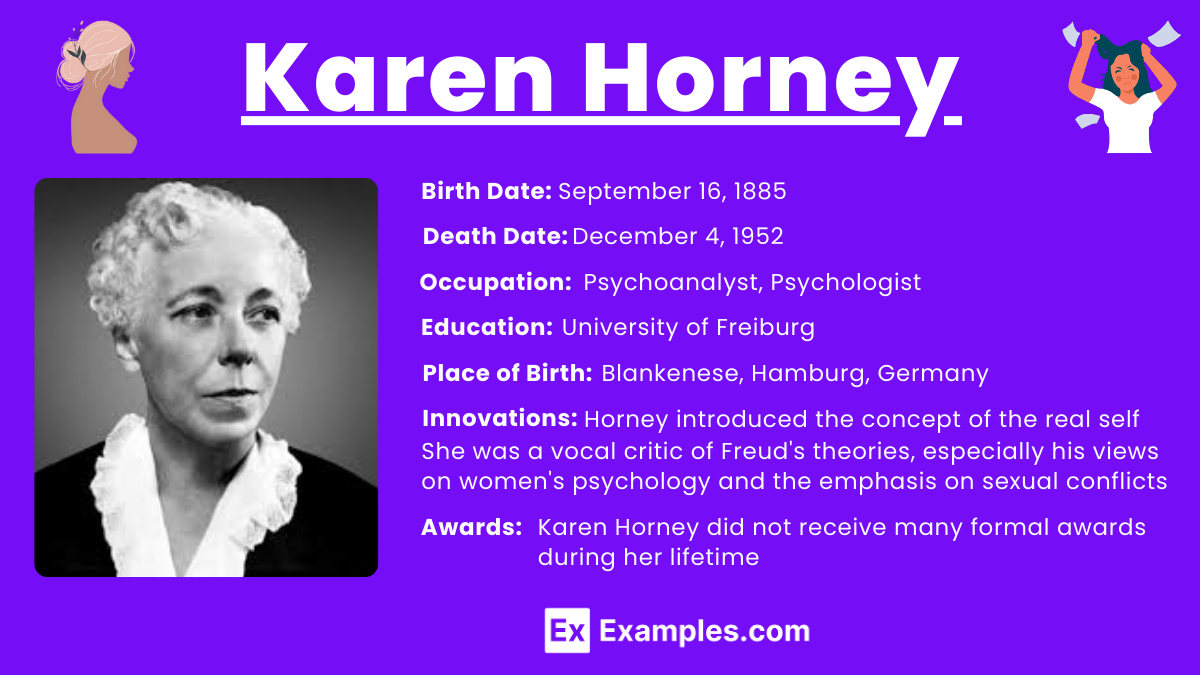
Birth Date: September 16, 1885
Death Date: December 4, 1952
Occupation: Psychoanalyst, Psychologist
Education:
- University of Freiburg
- University of Göttingen
- University of Berlin (MD, 1913)
Place of Birth: Blankenese, Hamburg, Germany
Innovations:
- Neurotic Needs Theory: Karen Horney identified ten neurotic needs that individuals use to cope with basic anxiety caused by interpersonal relationships. These needs fall into three broad categories: moving toward people (compliance), moving against people (aggression), and moving away from people (detachment).
- Feminine Psychology: She challenged Freud’s theories on women, particularly the concept of “penis envy,” proposing instead that social and cultural factors significantly influence women’s psychology.
- Self-Theory: Horney introduced the concept of the “real self” versus the “ideal self.” She believed that neurosis stems from a disconnection between an individual’s real self and their idealized self-image.
- Basic Anxiety: Horney emphasized the role of basic anxiety in development, stemming from feelings of helplessness and isolation in a potentially hostile world. This anxiety influences personality development and behavior.
- Critique of Freud: She was a vocal critic of Freud’s theories, especially his views on women’s psychology and the emphasis on sexual conflicts. She offered alternative perspectives that focused more on social and environmental influences.
Awards and Honors:
- Karen Horney did not receive many formal awards during her lifetime, as her work was often controversial and diverged from mainstream Freudian psychoanalysis. However, her legacy endures, and she is celebrated for her contributions to psychoanalytic theory and feminist psychology.
Karen Horney’s innovative ideas and critique of traditional psychoanalytic theory have had a lasting impact on psychology, particularly in understanding personality, neurosis, and the influence of cultural and social factors on psychological development. Her work paved the way for future developments in humanistic and feminist psychology.
Noam Chomsky (1928-)

Birth Date: December 7, 1928
Death Date: N/A (As of July 2024, Noam Chomsky is still alive)
Occupation: Linguist, Cognitive Scientist, Philosopher, Historian, Social Critic, Political Activist
Education:
- University of Pennsylvania (BA, 1949; MA, 1951; PhD in Linguistics, 1955)
Place of Birth: Philadelphia, Pennsylvania, USA
Innovations:
- Generative Grammar: Noam Chomsky revolutionized the field of linguistics with his theory of generative grammar, which describes the implicit knowledge that speakers of a language have about the structure and formation of sentences. His work introduced the concept of deep and surface structures in language.
- Universal Grammar: He proposed the idea of universal grammar, suggesting that the ability to acquire language is innate to humans and that all languages share a common underlying structure. This theory challenges behaviorist views and has profound implications for understanding language acquisition.
- Chomsky Hierarchy: He developed the Chomsky hierarchy, a classification of different types of formal languages based on their generative power. This hierarchy is crucial in the study of theoretical computer science and formal languages.
- Transformational-Generative Grammar: Chomsky introduced transformational-generative grammar, a model for understanding how different sentence structures can be derived from the same underlying form through transformations.
- Political Activism and Critique: Beyond linguistics, Chomsky is a prominent political activist and critic of U.S. foreign policy, neoliberalism, and corporate power. He has written extensively on political issues, including media manipulation and propaganda.
Awards and Honors:
- Kyoto Prize in Basic Sciences (1988)
- Helmholtz Medal (1996)
- Benjamin Franklin Medal in Computer and Cognitive Science (1999)
- Numerous honorary degrees from institutions worldwide, including Harvard, Cambridge, and the University of Chicago
- Inducted into the American Academy of Arts and Sciences and the National Academy of Sciences
Noam Chomsky’s groundbreaking work in linguistics has profoundly influenced the field, reshaping our understanding of language and mind. His theories on generative grammar and universal grammar continue to be foundational in linguistic research. Additionally, his contributions as a political thinker and activist have made significant impacts on social and political discourse globally.


